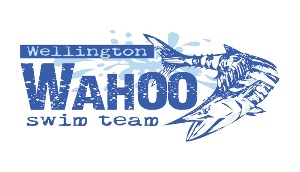OUR Mission, Vision and Philosophy
The Mission
The Wellington Wahoo's program is dedicated to providing opportunity and encouragement for all of its swimmers to make an uncompromised commitment to the pursuit of excellence and, through the process of striving to be the best that they can be, to acquire life-enhancing attributes such as integrity, character, discipline, teamwork, and sportsmanship. As an organization, we will protect our swimmers by providing a safe, healthy, and positive environment for all of our athletes.
The Vision
Our Program was established to provide a structure within which competitive swimming could help each athlete reach their personal potential and strive to reach obtainable goals and achieve success. The lessons of success in the pool, from the discipline, hard work and dedication will transfer to a productive and successful life.
Core values of the Club are:
It will be professionally managed and directed by the head coach.
It will be supported by swim parents, and the Village of Wellington
All programming will be athlete driven, at all times.
The primary focus of the team is to encourage each and every member to achieve his/her peak individual potential as a competitive swimmer and, at the same time, to develop a love of swimming as a life-long source of fitness and health.
A swimmer can only achieve his or her highest competitive potential through effort and dedication. This requires significant sacrifices in the time devoted to training and in adopting a single-minded focus on training goals. Parents must also be prepared to support swimmers financially, emotionally and by acting as a chauffeur at inconvenient times. The rewards for swimmers come first in the form of success in competitions, but also in self-confidence, fitness, highly developed time-management skills and a self -discipline that will carry over into all life skills and professions.
Coach Philosophy
The coaches have developed nine equally important tenets for their philosophy.
1. Hard Work. All swimmers must invest their time and effort into the sport and swimmers will be challenged accordingly. Success in competition is the direct result of how much work each individual puts into it. Similarly, there are no shortcuts for a coach or a swimmer. Consistent and persistent effort by athletes and coaches is a pre-requisite for achieving anything worthwhile in swimming.
2. Everyone counts. The most important people to us, after our families, are the athletes that we see and coach almost daily. We care about all of the swimmers on our team, whether they are the fastest or the slowest. We are concerned about the attitude and the improvement of every team member. Team strength comes from raising the standards of all team members.
3. Winning. Winning must be measured against one meaningful and reliable standard - yourself. Every swimmer on the team can be and should be a winner. A winner sets goals and then strives to attain them. Both swimmers and coaches who continue to strive for their goals are winners.
4. Athletes Experience Success. An athlete who achieves is a motivated athlete. There will be gradual movement to higher competitive levels according to the athlete’s development. A swimmer who attains a goal usually wants to attempt to reach a new one at a higher level. We will acknowledge success, regardless of the level at which a swimmer is succeeding and then help readjust the swimmers goal to attain a higher level of success.
5. Responsibility is required. We are responsible for our team’s results. Similarly, the swimmers must accept the responsibilities of their choice to be on the team.
6. Technique and training. All swimmers must establish and practice good technique so they can train effectively. We will keep returning to basics to help swimmers reach their performance goals.
7. Equal Opportunity, Not Equal Time. It is impractical to give equal time to each athlete, because they all have different needs. It is more important to give each athlete equal opportunity to take advantage of our desire to work with all of them. Those who are willing to give more of themselves in training and competition gain the most benefit from our coaching efforts.
8. Change is necessary. Programs need to be dynamic to maintain the enthusiasm of the athletes and the coach. The athletes and the "best" ways to teach and train them will change. That is why the coaches will continue to form new ideas and be creative. One of the keys to longevity in coaching is adapting to change. Also swimmers need this skills things will never be the same everytime.
9. Always strive for improvement. Coaches have to constantly renew their knowledge. Those who think they know everything about coaching swimming are on a downhill slide. Learning opportunities are all around, and successful coaches learn to recognize and to use them.
Program
The coaches use the following criteria for placing swimmers in groups.
Age: Swimmers are grouped by age and skill levels.
Performance: Swimmers are grouped by ability. Appendix B has time standards for each age group. Appendix C series of practice test sets
Techniques: As the swimmer progresses, it is expected that he/she will be prepared to work on and master the finer points of stroke technique, starts, turns and race strategy.
Ability to train: The swimmer must demonstrate he/she will be able to handle the training load of the new group. Ability to meet the group standard is important for the self-image and confidence of the swimmer. If there is a doubt, the swimmer will be placed in a lower group with the opportunity to move up.
Attendance: Swimming requires commitment to practice schedules and meet participation. As a swimmer moves up the competitive ladder, there are more practices of longer duration. If a swimmer does not attend practice on a regular basis, he/she is less able to improve performance.
Attitude: While swimming performance is expected to improve over the long run, in the short run there will be ups and downs. As the swimmer moves up the competitive ladder, he/she must be able to handle the stresses of intense training and competition and also balance swimming with other aspects of life (school and extracurricular activities).
Movement: Movement from one group to another is based on meeting the criteria for the next group. In other words, it is a combination of age, performance, technique, ability to train, attendance, and attitude; not age or performance alone. Achieving the time standards or workout sets does not necessarily mean movement to the next group, but means that the swimmer is eligible to be considered for the group. Most changes are made at the end of the long course season (July), but there may be changes made in December and after the Short Course season (March).
Additional Training
Private Coaching. These are designed to provide the swimmer with intense instruction in a one on one environment for the swimmer and coach. The focus in these sessions is on skill/stroke work, not fitness development. Video analysis may be used to provide precise breakdown of each stroke and recommended improvements. Sessions are 30 minutes in length. Private lessons are arranged upon request. The cost is $30.00 per session.
Associations
Competitive amateur swimming is structured at international, national, state and local levels. The governing body at the international level is F.I.N.A. (Federation International de Nation Amateur). The USA national governing body is the USA Swimming.
In South Florida, is the Local Swimming Committee and it is the governing body with powers and responsibilities delegated by U.S.A. Swimming. Wellington Swim Team is a member club of the FGC. All competitive swimmers are required to pay an annual registration fee to USA Swimming. This is your family’s insurance policy in the event your child was injured during a practice or at a swim meet. Each athlete under this mandatory registration is covered under USA Swimming up to $1,000,000. Through participation in the FGC, Wellington swimmers are able to compete at the local, Florida state, national and international swim meets. Further information about USA Swimming may be obtained from their website or offices at:
USA Swimming
One Olympic Plaza
Colorado Springs, Colo. 80909
719.866.4578
Hours: 8:30 am - 5:00 pm, M-F
www.usaswimming.org


